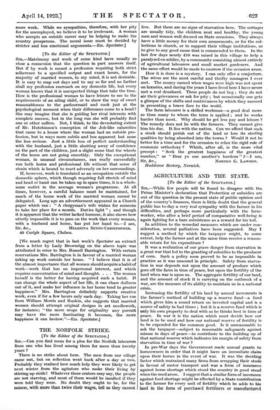[To the Editor of the SPECTATOR.] Sin,—Matrimony and work of
some kind have usually so close a connexion that the question in part answers itself. But if by work is meant a profession requiring both strict adherence to a specified output and exact hours, for the majority of married women, to my mind, it is not desirable. It is easy to map out days and to say so far and no farther shall my profession encroach on my domestic life, but every woman knows that it is unexpected things that take the time. How is the professional woman to have leisure to see to the requirements of an ailing child, or to show the way of sweet reasonableness to the parlourmaid and cook just at the psychological moment when their differences come to a head? She may imagine that she is guiding her rival interests with complete success, but in the long run she will probably find one or other suffers. Not, I think, to the devastating extent of Mr. Hutchinson's conception of the Job-like calamities that came to a house where the woman had an outside pro- fession, but in ways more subtle and less apparent but none the less• serious. Just a little loss of perfect understanding with the husband, just a little shutting away of confidence on the part of the children, just a slight sense that the wheels of the home are not going smoothly. Only the exceptional woman, in unusual circumstances, can really successfully run both home and professional life without that sense of strain which is bound to react adversely on her surroundings.
If, however, work is translated as an occupation outside the domestic sphere, which though requiring full stretch of mind and head or hand can be taken up in spare times, it is a whole- some .outlet in the average woman's programme. At all times, however, a careful balance must be maintained, for much of the home work of the married woman cannot be delegated. Long ago an advertisement appeared in a Church paper which ran : " A clergyman's wife wishes for someone to -take her place for a month. Duties light " ; and though it is apparent that the writer lacked humour, it also shows how utterly impossible it is to pass on the work that every woman, with a husband and home, has put her hand to.—I am,
[We much regret that in last week's Spectator an extract from a letter by Lady Brownrigg on the above topic was attributed in error to Mrs. Russell Barrington. With certain reservations Mrs. Barrington is in favour of a married woman taking up work outside her home. " I believe that it is of the utmost importance that all women should acquire a habit of work—work that has an impersonal interest, and which requires concentration of mind.and thought. . . . The woman herself is the better for having acquired such a habit. It can change the whole aspect of her life, it can chase dullness out of it, and make her influence in her home-tend to greater happiness." Mrs. Barrington definitely supports creative work, even if for a few hours only each day. Taking her cue from William Morris and Ruskin, she suggests that married women should attempt original designs in art needlework, for instance; " the more scope for originality any pursuit may have the more fascinating it becomes, the more happiness it can bestow."—En. Spectator.]










































 Previous page
Previous page